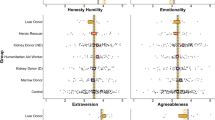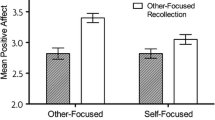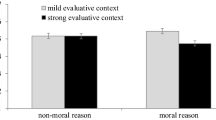Abstract
We investigated whether (a) people positively reevaluate the characters of recently dead others and (b) supernatural primes concerning an ambient dead agent serve to curb selfish intentions. In Study 1, participants made trait attributions to three strangers depicted in photographs; one week later, they returned to do the same but were informed that one of the strangers had died over the weekend. Participants rated the decedent target more favorably after learning of his death whereas ratings for the control targets remained unchanged between sessions. This effect was especially pronounced for traits dealing with the decedent’s prosocial tendencies (e.g., ethical, kind). In Study 2, a content analysis of obituaries revealed a similar emphasis on decedents’ prosocial attributes over other personality dimensions (e.g., achievement-relatedness, social skills). Finally, in Study 3, participants who were told of an alleged ghost in the laboratory were less likely to cheat on a competitive task than those who did not receive this supernatural prime. The findings are interpreted as evidence suggestive of adaptive design.
Similar content being viewed by others
References
Alexander, R. 1987 The Biology of Moral Systems. New York: Aldine de Gruyter.
Altman, D. G. 1991 Practical Statistics for Medical Research. London: Chapman & Hall.
Andrews, P. W., S. W. Gangestad, and D. Matthews 2002 Adaptationism: How to Carry Out an Exaptationist Program. Behavioral and Brain Sciences 25:489–504.
Atran, S., and A. Norenzayan 2004 Religion’s Evolutionary Landscape: Counterintuition, Commitment, Compassion, Communion. Behavioral & Brain Sciences 27:713–730.
Barrett, C., and T. Behne 2005 Children’s Understanding of Death as the Cessation of Agency: A Test Using Sleep versus Death. Cognition 96(2):93–108.
Barrett, J. L. 2000 Exploring the Natural Foundations of Religion. Trends in Cognitive Sciences 4:29–34.
Becker, E. 1973 The Denial of Death. New York: Free Press.
Bering, J. M. 2002 Intuitive Conceptions of Dead Agents’ Minds: The Natural Foundations of Afterlife Beliefs as Phenomenological Boundary. Journal of Cognition and Culture 2:263–308.
2005 The Evolutionary History of an Illusion: Religious Causal Beliefs in Children and Adults. In Origins of the Social Mind: Evolutionary Psychology and Child Development, B. Ellis and D. Bjorklund, eds. Pp. 411–437. New York: Guilford Press.
in press The Folk Psychology of Souls.
Bering, J. M., and D. F. Bjorklund 2004 The Natural Emergence of Reasoning about the Afterlife as a Developmental Regularity. Developmental Psychology 40:217–233.
Bering, J. M., and D. D. P. Johnson 2005 “O Lord ... You Perceive My Thoughts from Afar”: Recursiveness and the Evolution of Supernatural Agency. Journal of Cognition and Culture 5:118–143.
Bering, J. M., and T. K. Shackelford 2004 The Causal Role of Consciousness: A Conceptual Addendum to Human Evolutionary Psychology. Review of General Psychology 8:227–248.
Bering, J. M., C. Hernández-Blasi, and D. F. Bjorklund in press The Development of “Afterlife” Beliefs in Secularly and Religiously Schooled Spanish Children. British Journal of Developmental Psychology.
Bjorklund, D. F., and K. Kipp 2002 Social Cognition, Inhibition, and Theory of Mind: The Evolution of Human Intelligence. In The Evolution of Intelligence, R. J. Sternberg and J. C. Kaufman, eds. Pp. 27–54. Mahwah, N.J.: Lawrence Erlbaum.
Bloom, P. 2004 Descartes’ Baby: How the Science of Child Development Explains What Makes Us Human. New York: Basic Books.
Boyer, P. 2000 Functional Origins of Religious Concepts: Conceptual and Strategic Selection in Evolved Minds. Journal of the Royal Anthropological Institute 6:195–214.
2001 Religion Explained: The Evolutionary Origins of Religious Thought. New York: Basic Books.
Bulbulia, J. 2004 The Cognitive and Evolutionary Psychology of Religion. Biology and Philosophy 19:655–686.
Burnham, T., and B. Hare 2006 Engineering Human Cooperation: Does Involuntary Neural Activation Increase Public Goods Contributions in Adult Humans? Human Nature 17, in press.
Buss, D. M., M. G. Haselton, T. K. Shackelford, A. L. Bleske, and J. C. Wakefield 1998 Adaptations, Exaptations, and Spandrels. American Psychologist 53:533–548.
Clark, T. W. 1994 Death, Nothingness, and Subjectivity. The Humanist 54:15–20.
Cohen, J. 1960 A Coefficient of Agreement for Nominal Scales. Educational and Psychological Measurement 20:37–46.
Daly, M., and M. Wilson 1994 Evolutionary Psychology of Male Violence. In Male Violence, J. Archer ed. Pp. 253–288. London: Routledge.
Deigh, J. 1994 Cognitivism in the Theory of Emotions. Ethics 104:824–854.
Dennett, D. C. 1987 The Intentional Stance. Cambridge: MIT Press.
Emler, M. 1994 Gossip, Reputation, and Social Adaptation. In Good Gossip, A. Ben-Ze’ev, ed. Pp. 117–138. Lawrence: University of Kansas Press.
Fessler, D. M. T., and K. J. Haley 2003 The Strategy of Affect: Emotions in Human Cooperation. In The Genetic and Cultural Evolution of Cooperation, P. Hammerstein, ed. Pp. 7–36. Cambridge: MIT Press.
Fiske, A. P. 2002 Socio-moral Emotions Motivate Action to Sustain Relationships. Self and Identity 1:169–175.
Frank, R. 1988 Passions within Reason. New York: Norton.
Gilbert, P. 2000 Varieties of Submissive Behavior as Forms of Social Defense: Their Evolution and Role in Development. In Subordination and Defeat: An Evolutionary Approach to Mood Disorders and Their Therapy, L. Sloman and P. Gilbert, eds. Pp. 3–45. Mahwah, N.J.: Erlbaum.
Gould, S. J. 1997 Evolutionary Psychology: An Exchange. New York Review of Books 44:55–56.
Gould, S. J., and R. C. Lewontin 1979 The Spandrels of San Marco and the Panglossian Paradigm: A Critique of the Adaptationist Programme. Proceedings of the Royal Society of London B 205:581–598.
Gullone, E., N. J. King, B. Tonge, D. Heyne, and T. H. Ollendick 2000 The Fear Survey Schedule in Children-II (FSSC-II): Validity Data as a Treatment Outcome Measure Australian Psychologist 35:238–243.
Inagaki, K., and G. Hatano 2002 Young Children’s Thinking about the Biological World. New York: Psychology Press.
Johnson, D. D. P., and O. Krüger 2004 The Good of Wrath: Supernatural Punishment and the Evolution of Cooperation. Political Theology 5:159–176.
Kenyon, B. L. 2001 Current Research in Children’s Conception of Death: A Critical Review. Omega: Journal of Death and Dying 43:63–91.
Kuhlmeier, V. A., P. Bloom, and K. Wynn 2004 Do 5-month-old Infants See Humans as Material Objects? Cognition 94:95–103.
Luper, S. 2002 Posthumous Harm. American Philosophical Quarterly 41:63–72.
Povinelli, D. J., and J. M. Bering 2002 The Mentality of Apes Revisited. Current Directions in Psychological Science 11:115–119.
Pyszczynski, T., J. Greenberg, S. Solomon, J. Arndt, and J. Schinel 2004 Why Do People Need Self-esteem? A Theoretical and Empirical Review. Psychological Bulletin 130:435–468.
Pyysiäinen, I. 2001 How Religion Works: Towards a New Cognitive Science of Religion. Leiden: Brill.
Reynolds, V., and R. Tanner 1995 The Social Ecology of Religion. New York: Oxford University Press.
Rozin, P., J. Haidt, and C. R. McCauley 1993 Digust. In Handbook of Emotions, M. Lewis and J. M. Haviland, eds. Pp. 575–594. New York: Guilford Press.
Schelling, T. C. 1960 Strategy of Conflict. Cambridge: Harvard University Press.
Shapiro, J. L. 1988 Relationships between Dimensions of Depressive Experience and Evaluative Beliefs about People in General. Personality and Social Psychology Bulletin 14:388–400.
Slaughter, V., R. Jaakola, and S. Carey 1999 Constructing a Coherent Theory: Children’s Biological Understanding of Life and Death. In Children’s Understanding of Biology and Health, M. Siegal and C. C. Peterson, eds. Pp. 71–96. New York: Cambridge University Press.
Slaughter, V., and M. Lyons 2003 Learning about Life and Death in Early Childhood. Cognitive Psychology 46:1–30.
Sober, E., and D. S. Wilson 1998 Unto Others: The Evolution and Psychology of Unselfish Behavior. Cambridge: Harvard University Press.
Sosis, R. 2003 Why Aren’t We All Hutterites? Costly Signaling Theory and Religious Behavior. Human Nature 14:91–127.
Speece, M. W., and S. B. Brent 1984 Children’s Understanding of Death: A Review of Three Components of a Death Concept. Child Development 55:1671–1686.
Sperber, D. 1996 Explaining Culture: A Naturalistic Approach. Oxford: Blackwell.
Stocker, M. 1987 Emotional Thoughts. American Philosophical Quarterly 24:59–69.
Tomasello, M., M. Carpenter, J. Call, T. Behne, and H. Moll in press Understanding and Sharing Intentions: The Origins of Cultural Cognition. Behavioral & Brain Sciences.
Voyer, D., M. A. Rodgers, and P. A. McCormick 2004 Timing Conditions and the Magnitude of Gender Differences in the Mental Rotations Test. Memory and Cognition 32:72–82.
Wilson, D. S. 2002 Darwin’s Cathedral: Evolution, Religion, and the Nature of Society. Chicago: University of Chicago Press.
Author information
Authors and Affiliations
Corresponding author
Additional information
Jesse M. Bering is Assistant Professor of Psychology at the University of Arkansas and is a developmental and comparative psychologist by training. His research bridges classic existential psychology and empirical cognitive science, with a special focus on human representations of death and meaning.
Katrina McLeod is a second-year graduate student in Experimental Psychology at the University of Arkansas. Her master’s thesis is on the cognitive mechanisms underlying people’s implicit and explicit beliefs about the minds of dead agents.
Todd K. Shackelford received his Ph.D. in Psychology from The University of Texas at Austin in 1997. He is currently Associate Professor of Psychology at Florida Atlantic University, and Chair of the Evolutionary Psychology Area. His current research interests include conflict between the sexes, especially sexual conflict.
Rights and permissions
About this article
Cite this article
Bering, J.M., McLeod, K. & Shackelford, T.K. Reasoning about dead agents reveals possible adaptive trends. Hum Nat 16, 360–381 (2005). https://doi.org/10.1007/s12110-005-1015-2
Received:
Accepted:
Issue Date:
DOI: https://doi.org/10.1007/s12110-005-1015-2




